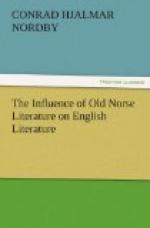“As to the literary quality of this work we might say much, but we think we may well trust the reader of poetic insight to break through whatever entanglement of strange manners or unused element may at first trouble him, and to meet the nature and beauty with which it is filled: we cannot doubt that such a reader will be intensely touched by finding, amidst all its wildness and remoteness, such startling realism, such subtilty, such close sympathy with all the passions that may move himself to-day.
“In conclusion, we must again say how strange it seems to us, that this Volsung Tale, which is in fact an unversified poem, should never before have been translated into English. For this is the Great Story of the North, which should be to all our race what the Tale of Troy was to the Greeks—to all our race first, and afterwards, when the change of the world has made our race nothing more than a name of what has been—a story too—then should it be to those that come after us no less than the Tale of Troy has been to us.”
Morris wrote a prologue in verse for this volume, and it is an exquisite poem, such as only he seemed able to indite. So often does the reader of Morris come upon gems like this, that one is tempted to rail against the common ignorance about him:
O hearken, ye who speak the
English Tongue,
How in a waste
land ages long ago,
The very heart of the North
bloomed into song
After long brooding
o’er this tale of woe!
. . . . . . . . .
Yea, in the first gray dawning
of our race,
This ruth-crowned
tangle to sad hearts was dear.
. . . . . . . . .
So draw ye round and hearken,
English Folk,
Unto the best
tale pity ever wrought!
Of how from dark to dark bright
Sigurd broke,
Of Brynhild’s
glorious soul with love distraught,
Of Gudrun’s
weary wandering unto naught,
Of utter love defeated utterly,
Of Grief too strong to give
Love time to die!
4.
Six years later, in 1877 (English edition), Morris published the long poem, The Story of Sigurd the Volsung and The Fall of the Niblungs, and in it gave the peerless crown of all English poems springing from Old Norse sources. The poet considered this his most important work, and he was prouder of it than of any other literary work that he did. One who studies it can understand this pride, but he cannot understand the neglect by the reading public of this remarkable poem. The history of book-selling in the last decade shows strange revivals of interest in authors long dead; it will be safe to prophesy such a revival for William Morris, because valuable treasures will not always remain hidden. In his case, however, it will not be a revival, because there has not been an awakening yet. That awakening must come, and thousands will see that William Morris was a great poet who have not yet heard of his name. Let us look at his greatest work with some degree of minuteness.




